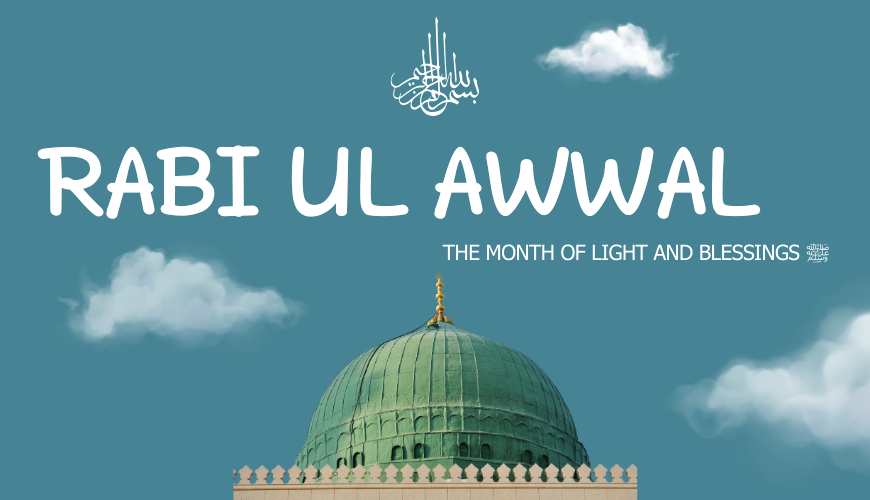The Month of Mercy: Unpacking the Significance of Rabi' Ul-Awwal

Rabi' Ul-Awwal, the third month of the Islamic calendar, holds a special place in the hearts of Muslims worldwide. Its name, translating to "the first spring," beautifully symbolizes the new beginning and blossoming of guidance that its events brought to the world. It is a time of reflection, renewal, and a deepened connection to the life and teachings of the Prophet Muhammad (peace be upon him). This month is not just a marker on the calendar; it’s an opportunity to immerse ourselves in the lessons and blessings that continue to emanate from the profound events that transpired within it.
The Dawn of an Era: The Birth of the Prophet
The most significant event of Rabi' Ul-Awwal is undoubtedly the birth of the Prophet Muhammad (PBUH) in Makkah in the year 570 CE. This was not just the birth of a child, but the arrival of the final messenger, a mercy to all of humanity. The Quran itself testifies to this, stating, "And We have not sent you, [O Muhammad], except as a mercy to the worlds" (Quran 21:107). His coming illuminated a world shrouded in ignorance, offering a beacon of hope, justice, and compassion. It is for this reason that many Muslims celebrate "Eid Milad-un-Nabi" (the festival of the Prophet's birth) on the 12th of Rabi' Ul-Awwal, a day of joyous remembrance and gratitude.
A Journey of Faith: The Hijrah
Rabi' Ul-Awwal also marks the month in which the Prophet Muhammad (PBUH) undertook the Hijrah, the migration from Makkah to Madinah. This pivotal event was not an act of abandonment, but a strategic move that led to the establishment of the first Islamic state and the flourishing of the Muslim community. The Hijrah teaches us profound lessons about sacrifice, perseverance, and unwavering faith in the face of adversity. It is a timeless reminder that with hardship comes ease, and that standing for one's beliefs often requires courage and a willingness to embrace change.
Lessons and Blessings for Our Time
The blessings of Rabi' Ul-Awwal are not confined to historical remembrance; they are a living source of guidance for our daily lives. This month encourages us to:
- Reflect on the Prophet's Character: It is a time to study the Seerah (the Prophet's biography) and to emulate his exemplary character. His kindness, patience, humility, and unwavering commitment to justice serve as a timeless model for all.
- Increase in Acts of Worship: While there are no prescribed acts of worship for this month, it is an opportune time to increase our prayers, supplications, and recitation of the Quran.
- Embody the Spirit of Mercy: In a world often fraught with conflict and division, the message of the Prophet as a "mercy to the worlds" is more relevant than ever. This month calls us to acts of charity, kindness to our neighbors, and compassion for all of creation.
Foster Unity: As Muslims around the world collectively remember the Prophet, it is a time to strengthen the bonds of brotherhood and sisterhood, transcending cultural and sectarian differences.
Observing Rabi' Ul-Awwal
While some celebrate Eid Milad-un-Nabi with gatherings and processions, many scholars emphasize that the most profound way to honor the Prophet is by following his Sunnah (his teachings and practices) in our daily lives. This can be done through simple yet meaningful actions such as:
- Sending Salawat (blessings) upon the Prophet.
- Learning and implementing his teachings in our interactions with others.
- Sharing his message of peace and compassion with the wider community.
Living the Seerah Today
Rabi’ Ul-Awwal is more than a month of remembrance—it is a reminder to embody the mercy, wisdom, and compassion of our beloved Prophet ﷺ in our everyday lives. True celebration lies not only in gatherings and processions, but in following his Sunnah and carrying his light into our families, communities, and the world.
If you’d like to introduce the Seerah to your children in an engaging and practical way, explore Seerat Kahani by Character Education Foundation — a beautifully designed two-book set that brings the Prophet’s life and lessons to young hearts.
Related Blogs


